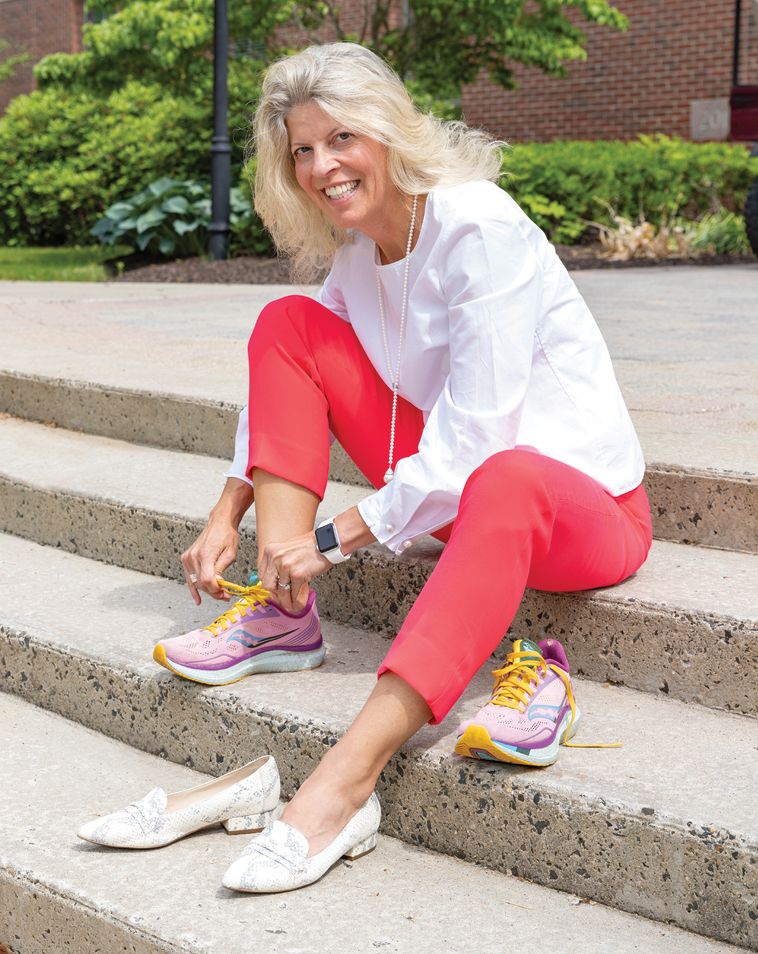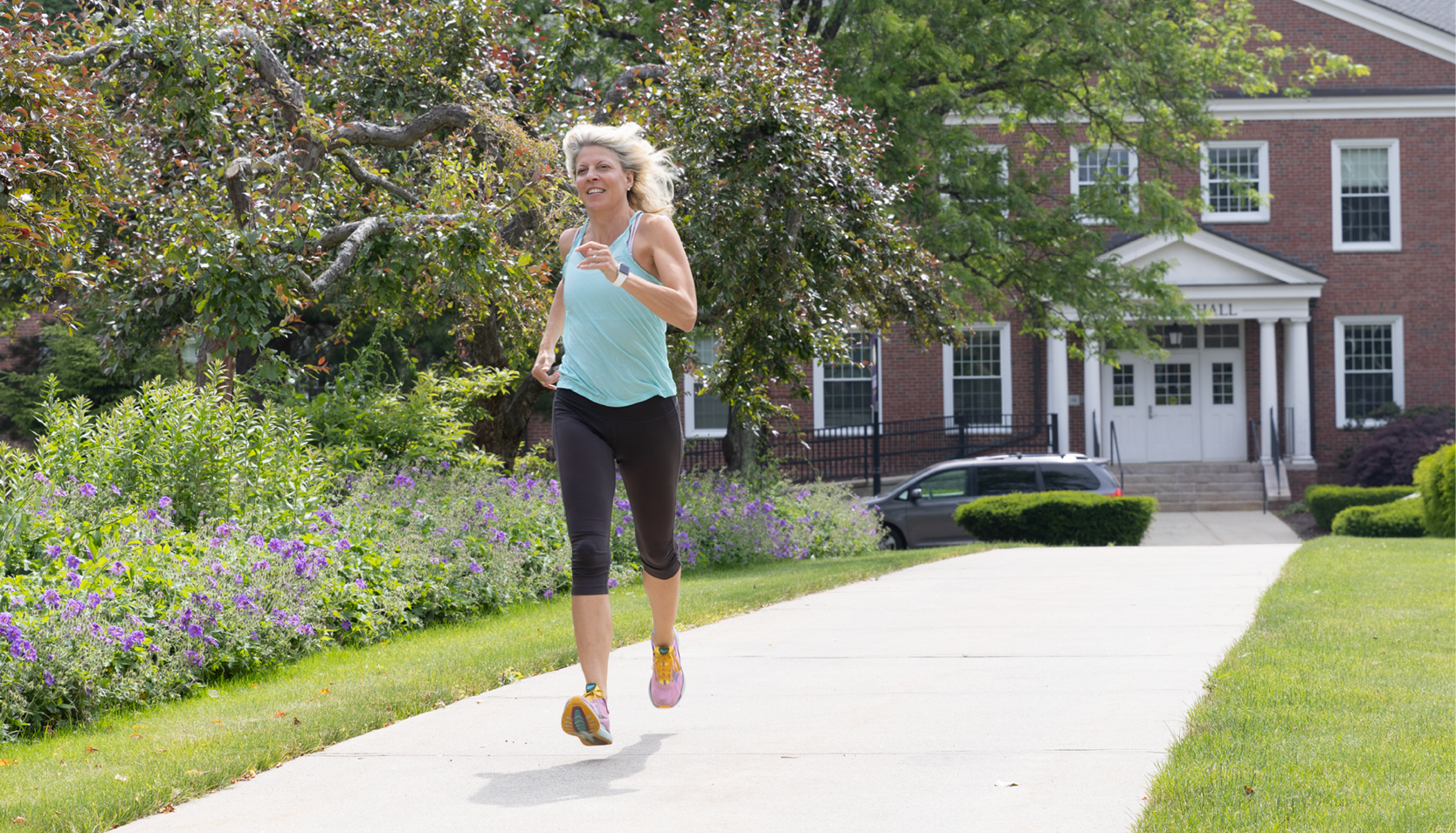
Embracing a Healthy Lifestyle
Walking the Talk of Health and Wellness with Dr. Melissa Mattison
By Patricia Gagnon
As the world enters a post-pandemic state, the outcomes of experiencing years of a global and deadly virus are starting to surface. Adding to the existing health concerns of an aging population are a host of problems aggravated by COVID-19, including the growing mental health crisis, sense of isolation, delays in receiving medical care, and economic impacts that exacerbate issues like food insecurity and insufficient nutrition.
The encouraging news is that people are more aware of their personal health and wellness and its importance than they were before the pandemic. A study conducted by Ipsos in 2021 during the height of the COVID-19 pandemic looked at how well-being might change in a post-pandemic world. The study found that 62 percent of Americans believe their health is more important to them now than before the pandemic.
Health and wellness have never been more vitally important, and while often used interchangeably, the terms health and wellness are different and distinct. WNE’s own Dr. Melissa Mattison, clinical associate professor of community care and assistant dean of experiential affairs, has spent most of her life both experiencing and teaching the powerful link between the two. Mattison asserts that health is a state of being associated with the physical, mental, and social well-being of a person, and wellness is the state of living a healthy lifestyle that can enhance that well-being.

“Healthy living is a cornerstone of my life; I eat well (most of the time), exercise daily, drink lots of water, and practice stress management. So many disease states are impacted by obesity, stress, nutrition, and lack of sleep, and I want the WNE students that we develop into future practitioners to be well-versed in living healthfully. By doing so, they will have the tools they need to counsel their patients on how to move in that direction,” says Mattison.
Improving Wellness Through Public Health
Public health has been of particular interest to Mattison. In 2023, she was selected as the sub-awardee of a $50,000 grant with the University of Rhode Island (URI) for naloxone education. The grant aims to educate healthcare professionals and the community about naloxone, a life-saving medication that can rapidly reverse opioid overdose. The main goal of the grant is to promote online modules and resources to community partners, residents, healthcare professionals, and students about naloxone administration, its importance, and the proper steps to take in case of an opioid overdose.
“WNE was fortunate to have URI reach out to be a partner to increase naloxone education in rural areas and train anyone and everyone to use naloxone. We hope the education will decrease stigma, increase awareness, answer any questions people might have, and ultimately, decrease the number of overdose deaths,” says Mattison.
“When it comes to public health, I think we need to look at messaging. Are we educating people about the importance of regular checkups, screenings, and immunizations? Do we promote services that make healthcare accessible? Do we address transportation needs? Do we address the underlying social determinants of health that affect people? Do all people have insurance so they can receive healthcare? Is there trust in the community of healthcare? There are so many pieces to the puzzle. We also have a shortage of healthcare professionals, and that will impact healthcare too, especially in the future,” stresses Mattison. “Partnering with community leaders in towns and cities may help build trust and address issues with receiving care. I would like to see more access to routine care, thereby preventing or delaying chronic issues. Let’s be creative and think about where people go in the community. If we had clinic before or after church on Sunday, would we be better able to provide routine care? If we were at the food bank, could we have more access to an important stream of patients?”
Tackling the Negative Effects of Obesity
In her role as clinical associate professor of community care at WNE, Mattison specializes in obesity and weight loss. She is the clinical director of the Community Patient Care Center on campus.
“When I started seeing patients in the clinic, I provided ‘lifestyle medicine.’ In other words, I counseled that through lifestyle modifications, patients would see positive results in their health outcomes,” says Mattison. “I worked with patients who wanted to lose weight to improve their health. Sometimes it was to improve their diabetes, and other times it was to reduce blood pressure or cholesterol conditions and decrease medications. I worked with patients who needed to lose weight to qualify for knee replacement or bariatric surgery. Sometimes patients just wanted to lose weight to feel better and move better. Traveling with patients on their weight loss journey is a very rewarding part of my work, only second to watching WNE students graduate after completing the PharmD program.”
Creating Interdisciplinary Clinical Education
Mattison was recently named assistant dean of experiential affairs, a role in which she oversees experiential and interprofessional education. She engages students in the classroom by teaching Self-Care Therapeutics, a professional pharmacy practice lab, an interprofessional elective with partner institutions, and a research elective.
“With my team, I get to place students on rotations throughout the country, which is very exciting and rewarding,” says Mattison. “I’m lucky to work with eight to 10 area institutions and promote interprofessional education. These are dedicated faculty and clinicians who want to change healthcare and work as a team from the very beginning of a student’s education.” The goal, she says, is to make sure students “are not siloed in their learning so that when they enter the workforce, they are team-ready.”
A Life Lived in Health and Wellness
Mattison lives what she teaches. The healthy lifestyle she enjoys includes running and biking—she even hiked part of the Long Trail in Vermont last summer. She met her partner, Glenn, more than 20 years ago when she walked into his bike shop in New Orleans to buy a bike for cross-training. She and Glenn have competed in triathlons together and are both Ironman triathletes.
“Glenn would tell you I’m very competitive,” she laughs. “So, when we bike together, we are usually trying to ride each other into the ground!” They have two children, Jack (17) and Cole (13).
Both children are competitive swimmers and golfers. “I love being a sports mom and seeing the positive impact it has on my kids. As a family, we enjoy being outside at the beach, hiking, skiing, and snowshoeing.”
Her grandparents lived to be over 90, and she notes her father, who is 78, still downhill skis. “I want to be healthy and active as I grow old. A side benefit for everyone in my life is that exercise helps me manage my stress and makes me a nicer person,” she says, smiling.

Mattison says her work at WNE is fulfilling in many ways. She enjoys her role as an educator, and even more, she appreciates what she learns from her students. “They make me a better parent and a better communicator. They inspire me to do more, and we work together to better our profession. They keep me on my toes every day—and nothing can slide. I love their enthusiasm, and I love graduation. That is the moment when I reflect on how far they have come in four short years and am proud of what we accomplished together.”
Grateful for the opportunities she has been given, Mattison looks forward to continuing her journey of caring for and educating others about the vital link between health and wellness and the impact that both have when practiced in tandem.
“Now more than ever, health and wellness should be prioritized,” she says. “It’s an honor and tremendously fulfilling to guide people toward making positive, impactful decisions so that they in turn live fulfilling, active, and balanced lives.”
Wellness in Action: Five Tips for Healthy Summer Living
-
Maintain Your Physical Activity–Exercise has immediate benefits like better sleep and reduced anxiety. However, in the summer, take precautions not to overheat. Exercise in the morning or evening when it’s likely to be cooler.
-
Drink Plenty of Water. Stay Hydrated!–Don’t wait until you’re thirsty. Water can help your body sweat and cool down. Avoid sugary or alcoholic drinks.
-
Wear Sunscreen and Cover Up–Use a sun protection factor (SPF) of at least 30. Reapply every two hours and after swimming or sweating. When you are out in the sun, wear clothing and a wide-brimmed hat to protect as much skin as possible.
-
Eat Healthy–Summertime vegetables and fruits like salads, melons, and berries add color and flavor to picnics and cookouts.
-
Beware of High Heat–Extreme heat is dangerous for everyone, though especially so for the young, the elderly, and those with chronic medical conditions.


